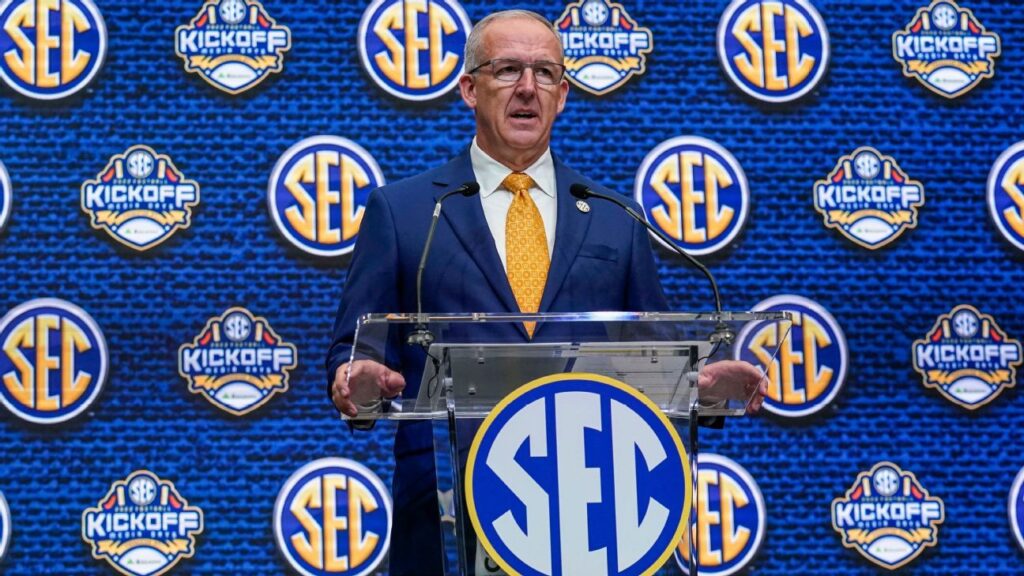DESTIN, Fla. — SEC Commissioner Greg Sankey outlined what congressional support for college sports would look like Monday night, calling it a “national system that deserves national standards.”
Sankey, speaking in opening remarks at the SEC's annual meeting here, discussed what college sports might look like after the Big Five conferences and the NCAA settled three antitrust lawsuits.
While settlement terms were finalized in recent weeks, college sports officials cautioned that the settlement should not be seen as a silver bullet to legal and other problems in college sports, but rather just the beginning of a new era in which schools will share revenue with athletes.
“I think Congress still has an opportunity to use this reconciliation framework to enact legislation that will strengthen the future of college sports,” Sankey said.
Sankey said he has already been to Washington, D.C., at least five times this year. He added that one of the big changes he's seen in his 10th year as an SEC commissioner is the number of members registered on his phone. He said the effort has evolved from “curiosity” to “kind of interest” and that educating people on what's needed will be a “continuous iteration.”
“I would welcome action between now and the election,” Sankey said. “Most people I've spoken to say that's unlikely, so the education process will continue after the election and it will depend on who the leaders of each party are in the House and Senate, where the majority is, who's in the White House. Those realities will drive the conversation.”
“I think it's going to remain as unpredictable as it has been.”
Any action by Congress would likely include elements to nationalize the rules and get around the current patchwork of state laws. Some of that ambiguity would be eased by the settlement, but not all of it. But Sankey noted that employment remains a thorny issue, and traditionally, collective bargaining requires that groups have employee status.
“The settlement is broad in scope and is intended to show us a way forward and provide some clarity about the future without automatically locking in jobs,” he said.
Mr. Sankey approached him and said, [taxed] Like a lawyer.”
He added: “There are people who are making that reality case. It brings me back to the fundamental assertion that there has never been a better time in the history of college sports to be a student-athlete than right now. Time and time again, they've stopped calling me and saying, 'I want to be an employee.'
Former Massachusetts Governor and NCAA president Charlie Baker has been a regular visitor to Washington to build momentum for the legislation. Nearly a dozen hearings have been held and more than a half-dozen bills have been drafted on college sports in recent years, but little concrete progress has been made.
“Obviously this is an election year,” Sankey said. “Congress is a tough place to serve, and with all due respect, our House members and our Senate members have a lot of work to do.”
Sankey also mentioned a number of other issues that will likely come up at the SEC meeting, including how the SEC will address settlement revenue sharing while complying with Title IX. Sankey noted that the SEC won four national championships this year, all in women's sports. He said the league “will have to wrestle with this new issue.”
“Our inclination would be to provide some level of fairness,” he said. “This is a very different world. We're going to invite opinions and perspectives, and we're going to have time to learn those perspectives, and then we're going to have to consider what that means from a decision-making standpoint.”
The settlement with the NCAA has also sparked speculation that teams might cap rosters as part of a new business model. An 85-player limit would likely eliminate walk-on positions, sparking anxiety among some football coaches. But Sankey said he told his coaches individually, “'Hey, guys, take it easy.'”
“I know it's been discussed in other conferences,” he said. “Their coaching staff has texted our coaching staff and they were excited, but we said wait. We'll have the discussion. That's the concept. I understand football gets all the attention, but we have 21 championship sports and all of them need to have some discussion about their roster makeup.”
Sankey also said “there will have to be some changes” in how the NCAA enforces the rules and instructs schools to comply with them. After the settlement terms are finalized, Sankey said the league will consider state laws because each state's laws are different.
“There are options,” he said, “and some freedom as to what they might look like. I'm not going to narrow it.”
In addition to the significant matter of the NCAA settlement, Sankey mentioned a range of other issues the league will discuss this week, including player eligibility reporting — a project some staff has been working on since last summer, but Sankey said no decisions are expected this week.
“We're not just trying to rush into something,” he said. “This isn't about injury reporting. It's a whole different situation because of the privacy issues we have. But when you start looking at the amount of money being wagered on legal sports betting on college sports, it's not just football, it's men's and women's basketball, volleyball, baseball — all of those things get a lot of attention.”
“We need to think carefully about how we manage information.”
ESPN's Dan Murphy contributed to this report.



